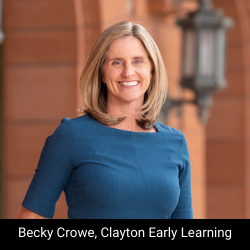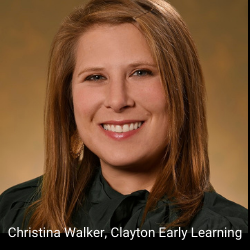
An Inside Look at Child Care Needs in Colorado
Q&A with Clayton Early Learning on Child Care During and After the Pandemic
While education as a whole was impacted by the COVID-19 pandemic, the already unstable early care and education sector was pushed to the brink of collapse, with many child care providers forced to lay off staff or close, when families, employers and communities needed them the most. We recently sat down with Becky Crowe, president and CEO of Clayton Early Learning, and Christina Walker, director of policy and advocacy, to dive deeper into the issues facing the early care and education sector in Colorado, and some of the policies and legislation that are key to ensuring stability and a system that can adequately support children, their families, providers, and employees.
WFCO: What were the different impacts you saw on larger organizations like Clayton Early Learning, and on smaller, rural organizations during the pandemic?
Becky: To begin with, it’s important to understand that the availability of quality child care and early learning is fundamental for economic development for families. At Clayton Early Learning, we serve 500 children directly, of whom 200 children ages 1-5, are in our Head Start or Early Head Start program. To qualify, families must be below the federal poverty guideline. We serve an additional 300 children in community-based programs or home-based visits.

There are approximately 7,000 children in Colorado’s Head Start programs. What we and other providers saw is that the economically vulnerable families we serve experienced a disproportionate impact due to the pandemic. These families were not able to transition their work to remote work, as many are front line or essential service workers and need a source of child care to be able to do their jobs. So, when we were all forced to shut down, Head Start providers needed to quickly redesign procedures and safety protocols to be able to quickly reopen so families could get to work as soon as possible.
Larger Head Start organizations like ours receive public funding, enabling us to experience greater financial stability throughout the pandemic. Family and friend, home based and private pay providers in Colorado have been hit hard. Our state has an enormous reliance on this broad network of providers, and in rural counties, the economic impact has been profound—with many providers, predominantly run by and staffed by women, closing their doors for good.
Approximately 10% of child care providers in Colorado closed their doors during the pandemic. How has this impacted parents, employers, and our state economy?
Becky: The pandemic has really shown us how reliant we are as individuals and as an economy, on child care providers. Inconsistent access to high-quality child care impacted most of us over the past year. As a state we weren’t able to meet the demand before the pandemic. The reduction in the availability of child care spots and providers has negatively impacted parents, workforce productivity and early care educators (who often work for very low wages). This has produced a ripple effect on the economy and the ability of our children and families to thrive.
During the pandemic I talked to families accessing food distribution at Clayton. I met a mother who drives a delivery truck for Costco. She and her siblings all lost their child care. Her mother ended up taking care of the nine cousins so the parents could go to work. The grandmother had to figure out how to feed the children every day. Clayton kids get 80% of their calories here on campus. When you cut off the access point to child care, you are also cutting off access to supports.

Christina: The majority of child care happens in informal settings – friends, neighbors, family members. That’s because many individuals need support outside the typical day – including those who work in healthcare and shift workers. Because of the lack of quality options available, many parents are forced into less-than-optimal child care situations. While this lack of a consistent, high-quality child care infrastructure existed before, it has been exacerbated by the pandemic.
Becky: High-quality early childhood learning sets children up for success. And a lack of investment has a huge impact on the ability for children and parents to thrive. For example, right now, 75% of Colorado’s Black and Latinx children don’t have access to high quality early learning experiences. By not investing in this sector, we’re missing out on an opportunity to provide a healthy start for children and impacting a parent’s ability to be productive in the workforce. If we were able to societally understand and value the impact of these early years, fund it appropriately and ensure teacher and caregiver salaries are commensurate with level of quality we expect, we can really see how the dots connect – overall economic mobility for families, child development for children, and workforce development for the state of Colorado.
Long-term funding for early learning has been low priority for many years. Do you feel like the tide might be turning with a greater awareness of the importance of child care following the pandemic?
Christina: I am optimistic, and I feel like we are truly at a turning point with respect to public awareness and political will. There has been a huge increase in funding on the national level, with the American Rescue Plan Act. Even the language has changed, with child care referred to as part of the infrastructure to keep our economy going. There have been recent historic investments in Head Start and Early Head Start and more bipartisan talk about the importance of the sector and the supports families need to thrive on the federal and state level.
I am optimistic, and I feel like we are truly at a turning point with respect to public awareness and political will. – Christina Walker
Becky: In Colorado, our governor has made early childhood a priority, recommending a new early childhood department and universal pre-K approved last November. These are real opportunities, as is the unprecedented level of collaboration across providers, advocacy organizations, government and the business community, and the growing realization of how deeply reliant the health of the economy and the future of Colorado is on child care. It’s a real opportunity to put children at the center and take a holistic approach, looking at all aspects of early childhood development, including family supports, so we can drive coherence and efficiency at all levels.
The road to recovery hinges on an inclusive economy. What would child care look like in a truly inclusive economy?
Christina: An inclusive economy within the early childhood sector, means providing the funding and supports necessary for the entire sector and all that it entails. The system needs to be ready to support families, with public funding to pay a worthy wage with benefits, and training and development for child care professionals that enable them to grow and develop.
Becky: Early childhood providers are the workforce behind the workforce. When we’re thinking about the number of women of color in this workforce, we have a huge opportunity to support economically sustainable work. We need flexible, high-quality training opportunities that meet people where they are and supporting them to grow and develop.
When we think about an inclusive economy, we need to look at a socially, geographically and economically just Colorado, where there are no care gaps and where rural and low-income communities have equal access to child care. And when we do, there’s no better investment than a whole child, whole family holistic approach to the early years. Through quality and comprehensive education, health, nutrition and more, plus career development for parents and caregivers, you gain a 13-1 return on investment for societal benefit, according to University of Chicago Economics Professor James Heckman.
There are many policies being considered this legislative session in Colorado to assist the sector. Is there one that Clayton Early Learning has prioritized?
Christina: One of our key policy priorities is House Bill 1222 – a bill to increase the supply of licensed family child care homes by treating them as residences for zoning purposes. Many municipalities and counties have different rules and regulations before providers can be licensed, which may be different from state procedures. It has been a huge issue for providers and this bill will provide consistency and best practices at the state level.
Another priority is Senate bill 236, which I know is a key priority for WFCO. It supports the creation of four new grant programs to increase capacity for early childhood care and education, improve recruitment and retention rates for early childhood educators, and improve salaries for educators. Another piece of legislation prioritized by WFCO and Clayton Early Learning is a new bill, HB21-1304, the Anna Jo Garcia Haynes Early Childhood Act, that supports the consolidation of all early childhood programs and services into a single, newly created cabinet-level department.
Becky: The key message is to really understand the holistic approach to child care with children and their families at the center. We have a window of opportunity to look through an equity lens to create systemic change that will positively impact Colorado for years to come.
Photo credit: Scott Dressel-Martin/Clayton Early Learning
Clayton Early Learning is an innovation hub that fosters thriving, equitable communities by partnering with families to nurture a whole child, whole family approach to the early years, discover what works, and advance systems change.
WFCO currently supports Clayton Early Learning through an Alliance for Early Success matching grant and in 2020 through the Women and Families of Colorado (WFCO) Relief Fund.

